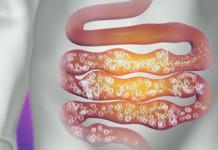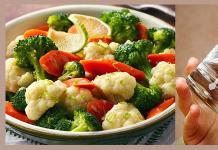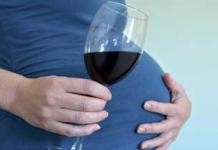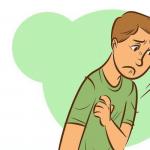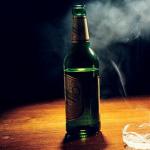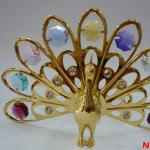When making an oncological diagnosis, in addition to the main therapeutic measures - surgery, radiation therapy and chemotherapy - the issue of revising the human diet is necessarily decided. The diet for rectal cancer is based on certain recommendations, the observance of which will allow not to injure the affected organ, but, on the contrary, to contribute to its active recovery, and hence the recovery of the patient.
Principles of nutrition in rectal cancer
From the moment a malignant lesion of the intestine is detected, one should not only begin treatment, but also completely change one's lifestyle in favor of healthy habits and the rejection of junk food. The diet should become fractional. It is recommended to eat in small portions and often - at least 5 times a day, while it is desirable that the time intervals between meals are approximately the same throughout the day.
Food should be baked, steamed or boiled, after carefully grinding. It is forbidden to eat cold and hot dishes and drink the same drinks. Fried, fatty, sour and smoked foods are completely excluded. The products must be exceptionally fresh, and the food must be prepared at one time. It is not recommended to store it and warm it up a second time.
So, the basic principles of the diet for rectal cancer are as follows:
- you can eat only high-quality, natural and fresh products;
- food should be easily digested by the digestive tract and be healthy and nutritious so that there is no deficiency of any substances in the body;
- in the daily diet, the predominance of cereals and vegetables is recommended;
- it is forbidden to starve and skip meals;
- drink at least 8 glasses of pure water per day;

- food must be chewed thoroughly, even if it is well crushed - saliva contains enzymes that already in the human oral cavity begin to split and assimilate various dishes;
- after the operation, it is important to exclude meat.
List of allowed and prohibited products
As mentioned above, a diet for a tumor of the rectum is required. Quite often, an unhealthy diet causes the development of benign and malignant tumors of the digestive system. Scientists were able to prove that carcinogenic substances contained in human nutrition contribute to the formation of oncology. Therefore, first of all, it is important to abandon the following products:
- fast food and any fast food;
- foods and drinks with sweeteners - soda, confectionery, mayonnaise, etc.;
- hydrogenated and refined oil;
- artificially grown fish species - carp, trout, etc., the fact is that antibiotics and other chemicals are often abused in such farms;
- meat-containing products - sausages, sausages, etc.;
- baking from white flour, it is useless and provokes constipation, besides, it is often bleached with chlorine;
- spicy and sour food additives - spices, vinegar, etc.;
- alcohol.
The list of allowed products includes:
- baked or steamed vegetables - carrots, tomatoes, zucchini, pumpkin, cabbage;
- fruits, mainly in the form of jellies, salads and purees, especially after surgery;
- fermented milk products - low-fat sour cream, kefir, cottage cheese and yogurt;
- lean types of meat, poultry and fish (hake, pollock, pike, etc.);
- cereals - oatmeal, buckwheat, rice;
- eggs, up to two per day;
- vegetable oil;
- stale bread, crackers, crackers;
- vermicelli, noodles.

Nutrition at an early stage of the disease
During drug treatment and preparation for surgery, it is necessary to follow a diet that is as gentle as possible to the rectum. The diet should be organized in such a way that the stool becomes regular and soft, and there are no constipations, which additionally injure the walls of the organ damaged by the tumor.
In addition, it is important to reduce the processes of putrefaction and fermentation in the intestines with the help of properly organized nutrition, as they provoke increased gas formation and discomfort in this area. Foods to be avoided during this period include whole milk, fresh berries and fruits, foods rich in carbohydrates.
Comprehensive information on nutrition can be given by a dietitian or gastroenterologist. Often, such advice is given to the patient by the oncologist after the diagnosis and the therapist.
Nutrition in the late stage of the disease
In the last stages of the malignant process with metastases, many patients experience such unpleasant symptoms as fatigue and weakness, nausea and vomiting, aversion to food, changes in taste and smell preferences, stool disorders such as constipation or diarrhea.
All these clinical manifestations provoke such a complication as inevitable weight loss. You can return the patient's appetite and improve his quality of life at an advanced stage of cancer with the help of foods that have an increased calorie content. These include:
- nuts and dried fruits with a pleasant aroma;
- strawberries, blackberries and other odorous berries and fruits that stimulate the appetite;
- freshly cooked lamb, rabbit or poultry meat with herbs.

All dishes should have a human body temperature - in this case, they retain their aroma as much as possible.
The food itself should be carefully wiped and fractional. It should be based on four food groups:
- fruits-vegetables-berries;
- dairy products;
- protein meals;
- cereals.
Diet before treatment and surgery
The main tasks that should be solved by nutrition in rectal cancer before surgery:
- normalization of the immune defense of the body;
- prevention of the division of atypical cells and the spread of the malignant process - metastasis;
- the absence of damaging factors on the tissue of the affected organ, namely the prevention of constipation, gastrointestinal dysfunction, etc.
So, what can a patient eat before surgery?
- Only freshly prepared food without excess fat.
- Products enriched with selenium - a component that destroys cancer cells in the body: fish, liver, cereals, eggs, legumes and dried fruits.
- Dairy products - yogurt, sour cream, kefir.
- Fruits and vegetables in thermally processed form to prevent excessive gas formation.

At the same time, it is forbidden to use mayonnaise, ketchup, margarine and other non-natural high-calorie foods. It is important to give up sweets and confectionery, as carbohydrates accelerate the growth of atypical cells and contribute to the development of a high degree of malignancy of the neoplasm. Fresh bread and milk are removed from the menu as dishes that increase flatulence.
The main point in the organization of nutrition before the operation is fractional meals, thermal processing of all products and their preliminary grinding to a semi-liquid consistency.
Diet after surgery and treatment
Dietary principles after surgery for rectal carcinoma also need to be carefully considered so that the diet is as balanced and of high quality as possible. Nutrition directly depends on the outcome of the operation, namely the patient's ability to empty the intestines - independently or through an installed tube (colostomy).
On the first day after surgery, the intake of any food is excluded. This is necessary for the rest of the gastrointestinal tract, namely the colon and rectum, their adaptation to new conditions.
Starting from the second day of the postoperative period, the patient is prescribed frequent fractional meals at 3-hour intervals. The recommended daily amount of water is 1.5 liters.
Consider in the following table what can and cannot be eaten by the operated patient.
After radiotherapy and chemotherapy, the role of diet is no less important. A gentle and balanced diet will help the body cope with atypical cells and regain the strength spent on the fight against oncology. He will not only return to normal faster, but the expected remission will come if all medical recommendations are followed.
Thus, properly organized nutrition in the postoperative period helps to normalize the functioning of the digestive tract, restore tissue damaged by the disease and prevent cancer from returning, since any irritating and negative factors will be excluded.
The difference in diet for patients with colostomy
It is most important to maintain proper nutrition for people with a colostomy, since such patients cannot control the process of bowel movement. Consider the features of the diet in this case:
- Food should be freshly prepared, easily digestible and must be mashed.
- It is important to consume enough protein in the form of fish and seafood, limiting carbohydrates as much as possible.
- Avoid any foods that cause flatulence.
- Drink at least 2 liters of liquid per day - purified non-carbonated water, herbal teas, fruit and berry compotes and decoctions.

Be sure to supplement the diet with the intake of multivitamin complexes to provide the body with the necessary beneficial trace elements.
Features of the diet for adults, children, pregnant and lactating, the elderly
Rectal cancer is a serious pathology that occurs in patients regardless of their gender and age. When a diagnosis is detected, it is important to start treatment as soon as possible in order to stop the growth of the tumor and prevent its metastasis. At the same time, diet plays an important role in the fight against this cancer.
But there are no fundamental differences in nutrition in individual groups of patients. Both children and adults are recommended the same principles of a therapeutic diet, including six meals a day, compliance with the list of allowed and prohibited foods, etc.
Menu for the week
We offer you to find out what an approximate diet looks like for a patient with rectal cancer for a week.
| days | Meyu |
|---|---|
| MONDAY | Breakfast: oatmeal on the water, tea. Lunch: yogurt, cookies. Lunch: lean borscht, bread, steam cutlets, jelly. Afternoon snack: cheesecakes, fruit drink. Dinner: zucchini with chicken, kefir. Snack: crackers, tea. |
| TUESDAY | Breakfast: buckwheat porridge, juice. Lunch: yogurt, fruit. Lunch: fish soup, rice with meatballs, compote. Afternoon snack: cottage cheese casserole. Dinner: chicken with buckwheat, salad, tea. Snack: kefir, crackers. |
| WEDNESDAY | Breakfast: scrambled eggs, juice. Lunch: baked fruit. Lunch: lean cabbage soup, meatballs with sour cream sauce, jelly. Lunch: cookies, compote. Dinner: buckwheat with chicken, tea. Snack: crackers, yogurt. |
| THURSDAY | Breakfast: cheesecakes, fruit drink. Lunch: fruit. Lunch: borscht, salad, steamed chicken chop, juice. Afternoon snack: rice pudding. Dinner: cabbage rolls, tea. Snack: cookies with kefir. |
| FRIDAY | Breakfast: millet porridge, jelly. Lunch: soft-boiled egg, juice. Lunch: vermicelli soup, fish with cauliflower, juice. Afternoon snack: cottage cheese casserole. Dinner: vegetable puree, chicken meatballs, tea. Snack: yogurt, cookies. |
| SATURDAY | Breakfast: rice porridge, compote. Lunch: muesli with juice. Lunch: lean cabbage soup, buckwheat, steamed cutlets, fruit drink. Afternoon snack: croutons, kefir. Dinner: pasta casserole, jelly. Snack: cracker, tea. |
| SUNDAY | Breakfast: wheat porridge, compote. Lunch: yogurt. Lunch: soup, rice, fish meatballs, juice. Afternoon snack: cookies, kefir. Dinner: stewed vegetables, salad, tea. Snack: ryazhenka, crackers. |
Recipes
To diversify the menu of a person with rectal cancer, it is necessary to master the recipes of some dishes. Let's look at them with an example.
Slimy soup with barley. Products: ¼ cup barley, 5 g butter, lean meat, 1 liter of water, salt.
Boil lean broth, add grits to it and simmer over low heat until soft. In the finished soup, put 1 tsp. oil and salt, grind with a blender. Such a dish is easily absorbed by the body and saturates it with nutrients. If desired, you can supplement the recipe with vegetables.
Meatballs. Products: lean meat, wheat bread, salt, sour cream.
Pass meat and soaked bread through a meat grinder in proportions of 2: 1. Add salt to the resulting mass. Form balls, put them in a saucepan and pour sour cream sauce with water (1: 1). Simmer until done.

Fish soufflé. Products: 200 g hake, 1 tsp. butter, egg, salt.
Boil the fish in a small amount of water, grind into minced meat. Add egg yolk, oil and salt. Beat with a blender until smooth and at the end add it with protein. Bake the soufflé in a slow cooker until done.
Preventive diet to prevent disease
Colon cancer is a serious pathology that can be fatal. To avoid this, it is important to think about the prevention of this disease, because it is easier to prevent a malignant process than to cure it. It has been proven that the main cause of intestinal carcinoma is an unhealthy diet and eating disorders, so it is important to pay attention to this problem.
The preventive diet consists of several recommendations, which we list in the table.
| Rules | Description |
|---|---|
| NO ALCOHOL | Alcoholic drinks adversely affect the state of the digestive system. This bad habit is an indirect factor in the development of malignant tumors in the gastrointestinal tract. Ethanol, once in the intestine, irritates the mucous membrane, inhibits the local microflora, and impairs immunity. Nicotine has a similar effect. |
| GET ENOUGH FIBER | The state of the gastrointestinal tract directly depends on what a person eats. If his food lacks fiber (fibers), peristalsis is inevitably disturbed and the contents of the organ stagnate, constipation and intoxication occur. As a result, the mucous membrane loses its natural ability to renew cells, problems such as growths, polyps, etc. are gradually formed. It is they who can lead to intestinal cancer. Therefore, it is important to include foods rich in fiber in your diet every day. |
| REJECTION FROM HARMFUL FOOD | Excessive consumption of fatty, salty, spicy and sour foods causes gastrointestinal disorders, a violation of the activity of the intestinal mucosa. It is advisable to boil or bake all products, completely abandoning frying, pickling and smoking food. |
Prevention of rectal cancer through a balanced diet is an important activity that should be paid attention every day. If the disease could not be avoided, a properly selected diet will help improve the quality of life of a person, prevent complications and other health problems caused by the tumor.
Are you interested in modern treatment in Israel?
It is called a malignant tumor that occurs in the intestines. The tumor grows from the inner layer of the intestine. Most often, this disease is found in people in adulthood. Neoplasm in size can be either insignificant, remaining on one intestinal wall, or large-scale, filling the entire intestinal cavity. This disease has a second name - colorectal cancer.
Quite often, after a doctor makes a disappointing diagnosis, patients begin to think: how to eat with rectal cancer? Which foods are contraindicated, and which, on the contrary, should be included in the diet? These are quite normal questions, because in addition to chemotherapeutic and other medical procedures, the body's need for food intake is in second place.
Dietary Diversity can also affect the formation of intestinal cancer. For example, with insufficient consumption of vegetables or cereals, an excess of meat and fatty food ingredients, stool disorders can be observed, for example, in the form.
Sedentary lifestyle, overweight, alcohol and tobacco abuse can also lead to the development of the disease.
Adverse factors in the development of bowel cancer can be infection of the patient with the papillomavirus, as well as anal sex.
Symptoms of a malignant tumor of the intestine
The manifestations of the disease include the following factors, divided into two groups:
- Uncharacteristic signs. This can manifest itself in a sharp jump in body temperature, refusal of food or aversion to it, exhaustion, fatigue, a change in taste preferences and dislike for familiar smells.
- Characteristic features. These include a clear release of mucus and all kinds of impurities during bowel movements, an increase, a change in the color of feces, and frequent urge to defecate.
Nutrition tips for bowel cancer
When making such a diagnosis, in addition to complex therapeutic measures, you should eat right.
Meals for rectal cancer should be balanced, rich in fruits and vegetables, as well as cereals.
A specially designed diet for oncology of the rectum should be worked out individually, meeting the requirements of a particular organism and the norms at a certain stage in the development of a malignant tumor.
Preoperative Diet
Diet objectives for rectal cancer before surgery:
- restoration of immunity;
- stopping the division and growth of cancer cells.
Preoperative diet for rectal oncology must meet the following requirements:
- Food should be fresh, without a large presence of fatty acids.
- It is forbidden to eat lard, mayonnaise, fat-containing foods, margarine and similar high-calorie foods.
- The ban on sweets is included, as it contributes to an increase in the number of cancer cells.
- Foods containing dyes and preservation ingredients are removed from the diet.
- Food should be enriched with selenium, as it contributes to the destruction of harmful cells. Selenium-rich foods include fish products, liver, eggs, cereals, legumes, and dried fruits.
An important point in a competent approach to nutrition before surgery is eating in small portions.. Products must be processed in gentle ways, that is, steamed or boiled.
Food should be at a moderate temperature, in the process of cooking, it should be cut into small pieces. It is undesirable to leave cooked food for the second meal, should be cooked in portions so that there are no food residues that are removed in the refrigerator.
After operation
 Nutrition after surgery on the rectum for oncology should be extremely thoughtful and of the highest quality.
Nutrition after surgery on the rectum for oncology should be extremely thoughtful and of the highest quality.
Also, nutrition for rectal cancer is prescribed based on how the bowel will be emptied - on its own or through a special tube.
On the first day after surgery, no food is allowed.. This is important so that the intestines rest for a while.
Nutrition after removal of the rectum in oncology is fractional and frequent, meals are taken every 3 to 4 hours. Water consumption is limited - a daily dose of 1.5 liters.
After the operation, it is forbidden to eat the following foods:
- milk products;
- bakery products;
- fruit and vegetable salads;
- eggs;
- sweet;
- carbonated drinks;
- cold food;
- smoked and pickled products;
- alcohol.
What can you eat after rectal surgery:

From this we can conclude that after the removal of the rectum, the diet is quite diverse. What can you eat in the first few days after surgery? See the menu below.
Five day menu
1 day:
- Morning: fruits.
- 2 breakfast: scrambled eggs with the presence of cabbage in it. You can add a piece of bread and herbal decoction to breakfast.
- Lunch: you can eat a crushed mixture of vegetables, a salad seasoned with sunflower oil, green tea.
- 1 dinner: boiled buckwheat porridge on the water, tea.
- 2 dinner: you can eat low-fat yogurt.
2 day:
- Morning: a handful of berries with sugar-free crackers.
- 2 breakfast: pilaf without meat with pieces of dried apricots or other dried fruits, green tea.
- Lunch: crushed cabbage mixture, boiled or baked chicken breast, tomato salad, tea with breadcrumbs.
- 1 dinner: cook barley porridge and add dried fruits. You can drink kefir drink, fermented baked milk or curdled milk.
- 2 dinner - acidophilus.
3 day:
- Morning: freshly squeezed vegetable or fruit juice.
- 2 breakfast: boiled oatmeal with whey.
- Lunch: vegetable soup, a piece of bread, a boiled piece of beef and mashed potatoes, berry juice.
- 1 dinner: vegetable salad with sunflower oil, a piece of bread or cracker and juice.
- 2 dinner: you can eat yogurt.
Day 4:
- Morning: Drink a glass of carrot juice.
- 2 breakfast: boiled buckwheat and tea with milk.
- Lunch: chicken soup with herbs, a piece of boiled fish, a tomato in a salad, herbal tea.
- 1 dinner: you can eat cheesecakes with crackers, fruit drink or juice.
- 2 dinner: include fruit.
Day 5:
- Morning: vegetable juice.
- 2 breakfast: millet on the water with pieces of prunes, a drink from berries.
- Lunch: low-fat cabbage soup, vinaigrette with a slice of bread, tea.
- 1 dinner: seafood soufflé, boiled rice, juice.
- 2 dinner - fruit.
Conclusion
As you can see, the diet after rectal surgery is quite rich in various ingredients. These rough recommendations were compiled by dietitians. It includes the much-needed vitamin supplements and trace elements for a weakened body.
During the period of adaptation after surgery, the patient should adhere to all the comments that the attending physician will prescribe. The success of recovery largely depends on the competent construction of a diet in the postoperative period.
When a patient is diagnosed with rectal cancer, in addition to mandatory chemotherapy and surgery, the question arises of revising and changing the habitual diet. A specially formulated diet for rectal cancer contains the necessary complex of vitamins and minerals, and at the same time does not irritate the diseased organ. By the way, a very small percentage of cancer patients is noted in Asian countries, where the daily diet consists of rice, fresh vegetables and seafood.
Diet for rectal cancer before surgery
Properly selected nutrition in the period before the operation has several goals:
- Supports the body's immunity.
- Prevents the spread of cancer cells.
Basic principles of nutrition in the preoperative period
Basically, the diet for rectal cancer before surgery is based on the following rules:
- Fresh, high quality, easily digestible food.
- Remove animal fat from the diet, including butter, spread, margarine, mayonnaise and other fatty foods.
- We remove sweets from the diet, and any products that contain sugar. It promotes the rapid development of cancer.
- Remove foods that contain dyes and preservatives.
- The food prescribed to the patient must contain selenium. It contributes to the successful fight against cancer cells. Products that contain selenium are: seafood, beef or pork liver, eggs, various cereals, especially unprocessed, any dried fruits and nuts. Cabbage and bean should be consumed with caution, as they can cause constipation, which will negatively affect the course of the disease.
- We remove products that contain preservatives, dyes and other additives starting with E.
It is also very important to eat little by little, breaking up meals into five to six times. The products themselves must be subjected to gentle processing: either steamed or boiled. It is necessary to monitor the consistency and temperature of food: too hot or cold food is excluded, food should also be finely chopped or ground. It is advisable to eat immediately after cooking, that is, do not leave food in the refrigerator and do not reheat additionally. To avoid problems with stools and flatulence, avoid foods that cause gas, such as milk, bread. Alcohol is also excluded from the diet.
Diet for rectal cancer after surgery
After the operation, the doctor also prescribes a special diet for the patient. It may be subject to adjustment, depending, for example, on whether the process of defecation will be natural or whether it will be carried out through a colostomy.
However, immediately after the operation it is necessary to observe one day without eating. This will allow the intestines to rest and avoid bowel movements. You can start eating from the second day. Missing elements and minerals are usually replenished through a dropper. The patient's meals are frequent - every three to four hours, the liquid is consumed no more than 1.5 liters per day.
In the future, the diet after rectal cancer contains the most sparing diet that does not allow the formation of gas or constipation.
Basic principles of nutrition in the postoperative period:
- Wheat biscuits, no sugar.
- Herbal teas.
- Dairy products: kefir, curdled milk, acidophilus, low-fat cottage cheese.
- Cereal soups.
- Bran.
- Lean meat: beef, veal.
- Any fruit and berry jelly.
- Porridge on the broth (fat-free or on the water).
- Steamed seafood.
Thus, the diet for rectal cancer after surgery is quite diverse.
- Fat-free broth. It is prepared as usual, then cooled. Be sure to remove the remaining fat on top. The rest of the broth is fat-free. On it and cook porridge or soups.
- All dishes are steamed.
- Seasoning minimum.
- It is useful to consume whole grain porridge daily with the addition of various seeds.
Menu
Doctors have compiled an exemplary diet after rectal cancer. It can be followed in the postoperative period, and much later.
- First day.
- Breakfast. Fresh, natural fruits.
- Second breakfast. Omelet with broccoli, you can add coarse flour bread. Herbal or green hour with a little milk.
- Dinner . Pureed chicken soup in low-fat broth. Vegetable salad dressed with oil (vegetable, olive) or sour cream. Boiled brisket. Bread. Green or herbal teas.
- Dinner. Buckwheat porridge on the water. Black tea.
- Second dinner. Homemade yogurt or cottage cheese.
- Second day
- Breakfast . Fresh berries or fruits. Wheat crackers without added sugar.
- Second breakfast. Crumbly rice porridge with dried apricots. Or with the addition of dried fruits. Black tea.
- Dinner . Vegetable soup with broccoli. Bread. Baked poultry meat with some avocado. Tomatoes stuffed with vegetables. Tea with milk.
- Dinner. Barley porridge with the addition of dried fruits. Fermented milk product: kefir, fermented baked milk or curdled milk.
- Second dinner. acidophilus
- The third day.
- Breakfast . Juice from fresh vegetables or fruits.
- Second breakfast. Oatmeal with whole milk. Heated milk.
- Dinner . Puréed vegetable soup. Bread. Boiled piece of beef with mashed potatoes. Fruit or berry juice / jelly.
- Dinner. Vegetable salad with butter dressing. Bread. Glass of fresh juice.
- Second dinner. Homemade yogurt.
- Fourth day.
- Breakfast . Carrot juice half a glass.
- Second breakfast. Loose porridge from buckwheat on the water. Tea with milk.
- Dinner . Soup in low-fat broth with chicken meatballs. You can add greens. Fish boiled or baked. Cucumber and tomato salad with olive oil dressing. Herbal or green tea.
- Dinner . Cheesecakes or casserole. Cranberry juice. Crackers.
- Second dinner. Fruits.
- Fifth day.
- Breakfast . Half a glass of fresh vegetable juice
- Second breakfast. Crumbly millet porridge boiled in water. You can add prunes. Warm herbal tea
- Dinner. Shchi in low-fat broth. Bread. A little vinaigrette with broccoli. Tea.
- Dinner. Fish soufflé with fluffy rice. Berry juice.
- Second dinner. Fruits.
- Sixth day
- Breakfast . Warm milk. Wheat croutons without sugar.
- Second breakfast. Crumbly rice porridge with dried apricots or nuts. Fresh fruit juice.
- Dinner . Vegetable borscht. Bread. Boiled or baked chicken meat with apples. Mashed potatoes. Fresh vegetable salad with sour cream or butter dressing. Warm tea.
- Dinner . Boiled or baked fish in sour cream. Some berry jam. Tea with milk.
- Second dinner. Homemade yogurt. Berries.
- Seventh day.
- Breakfast . Fruits.
- Second breakfast. Millet porridge. Acidophilus.
- Dinner. Pureed cabbage soup. Bread. Baked chicken or turkey meat. Leaf salad with lemon dressing. Tea.
- Dinner . Tomatoes with eggplant, can be baked. Tea.
- Second dinner. Cheese or cheesecake with nuts.
This diet was compiled by professionals, doctors and nutritionists. It can be noted that the menu is quite diverse, it combines all the vitamins and microelements necessary for the weakened body of the patient.
Recipes
For an example of a similar menu for a diet for rectal cancer, here are a few necessary recipes.
- Pearl soup. To prepare it, you need 250 grams of fat-free meat broth. Pour 25 grams of barley into it - this is about 2 tablespoons. You can add a little oil, salt and a little sugar. Soups of this kind are perfectly digested. You can also add the vegetables or meat mentioned in the menu, which we thoroughly grind in a blender to a puree state. You can cook with any other cereal.
- Meatballs. We take lean meat of beef, chicken or veal, a little wheat bread soaked in broth, and grind it into minced meat. From it we form small round cutlets, which are then steamed or boiled in water. Can be served with sour cream sauce.
- Fish soufflé. We take any low-fat fish in 137 grams, a little low-fat broth - 25 grams, 3 grams of butter, a third of an egg and a little salt. Boil the fish, cool, remove the skin and bones. Grind into minced meat, then add the egg yolk, oil and salt. Beat the resulting mass and also add well-whipped egg whites. Put on a baking sheet and steam.
- Knel. The ingredients are the same as in the soufflé. We clean the fish from the skin and bones. Soak some bread in low-fat broth. Mix bread with fish. Salt, add proteins. With the help of a tablespoon, we form two quenelles and cook in boiling water for several minutes.
- Beef soufflé. We take one hundred grams of lean beef, boil it, remove the tendons and twist the minced meat. Combine with bechamel sauce, add half the chicken yolk, a little oil, mix. Then add beaten egg whites. Mix well, transfer to a frying pan and bake on a steam bath. Similarly, you can cook chicken soufflé.
- Vegetable stew . We take 50 grams of mushrooms, 200 grams of broccoli, 250 grams of chicken fillet, fat-free broth, tomatoes, olive oil. Shiitake mushrooms have the most effective anti-cancer effect. Fry the mushrooms in oil, then add the meat and continue to fry until a small crust appears. Put the fried mushrooms with chicken into the pot with the broth, wait until it boils, then add the broccoli. Meanwhile, simmer finely chopped tomato with garlic, and add to the pan. After fifteen minutes of stewing, the dish can be eaten.
The prognosis for successful recovery after treatment of oncological diseases, first of all, depends on the timeliness of their diagnosis and high-quality therapy.
At the same time, of no small importance in tumor formations, especially those that affect the organs of the gastrointestinal tract, is the properly organized nutrition of a sick person.
Colon cancer is the transformation of healthy cells into tumor cells through gene mutation processes. It develops in the epithelial tissues of the mucosa of any area of the organ and has all the characteristics of a malignant pathology.
It is classified according to the following types:
- based on the shape of the anomaly: exophytic, mixed, endophytic;
- according to histological content: glandular, squamous, melanoma, skip, as well as their mixed varieties;
- in striking degree: low-differentiated, medium-differentiated and highly differentiated;
- by location of education: anal, ampullar, supramullary.

The stages are distinguished:
- 1 stage– mobility and dimensions are limited;
- 2 stage- the tumor grows, but does not leave the organ in which it develops. Metastasis does not occur;
- 3 stage- the anomaly spreads throughout the body, the processes of metastasis are actively working;
- 4 stage- the tumor forms decay products and is no longer amenable to control and any type of treatment.
Target
A correctly selected diet for this type of tumor diseases pursues a number of goals that are significant for the patient's health:
- increase in the overall level of immunity the patient's body, which subsequently gives him additional strength to fight cancer;
- relief of the load on the affected organ, which takes an active part in the processes of digestion of food;
- exclusion of the development of fermentation processes that provoke diarrhea, gas formation and bloating;
- stopping the activity of affected tumor cells and an obstacle to the emergence of new ones.
Features of nutrition during treatment
As a rule, the essence of dietary nutrition in the treatment of rectal cancer is that the food should be:
- only freshly prepared;
- qualitative in its composition;
- quickly absorbed by the body.
It is necessary that the products are saturated with selenium - its detrimental effect on tumor cells has been scientifically proven. During therapy, the following rules should be followed:
- completely eliminate animal fats, confectionery, preservatives and food additives;
- eat fractionally, in small portions, at least 5-6 times a day;
- cook or cook dishes by steam processing;
- avoid temperature fluctuations in the consumed drinks and products;
- the consistency of dishes should have a puree-like state, solid ingredients should be ground beforehand;
- dishes cannot be stored in the refrigerator - you need to cook just enough so that the patient can eat the entire portion at one time;
- control the processes of gas formation - they should be minimized;
- exclude alcohol in any of its manifestations.
At the recovery stage, in order to maintain the strength of the body and enhance the effectiveness of the therapy, it is necessary:
- in the event of an operation- start eating only from the second day - so there will be no load on the rectum;
- number of meals- every 2 - 3 hours;
- plentiful drink- about 2 liters per day;
- first courses should be made on fat-free broths, with a minimum amount of salt and seasonings;
- provide the body with the right amount of minerals and vitamins- they will not only give strength, but are also easily absorbed by the diseased organ. In the first days after treatment, their optimal concentration is achieved with medication, and then with properly selected dishes.

It is important to remember that the patient should eat no more than 2 kg of food per day in total.
Prohibited Products
Those patients who, prior to the detection of pathology, had a weakness for fatty foods, meat, mayonnaise and other harmful culinary delights, will have to give up all this.
With this type of disease, the dietary requirements are quite categorical, since the harm caused by improper nutrition can completely negate all the success of the previous treatment.
Prohibited:
- alcohol- drinks are oversaturated with carcinogens, which in this case is simply detrimental to the organ injured by the disease and treatment;
- industrial sweets- they contain synthetic food substances of artificial origin, producing cell mutation;
- all types of smoked meats- this is an excessive load on the intestines, even in its healthy state;
- tea, coffee, cocoa, chocolate of any kind- all of them actively stimulate the processes of degeneration of tissues from healthy to abnormal. This is due to the high concentration of the caffeine component in the listed products;
- carbonated sweet drinks- they cause bloating and disrupt the natural processes of gas exchange;
- sweets, jam- due to the maximum permissible concentration of sugar-containing substances in them;
- industrial meat and fish canned food- they contain a large number of compounds that ensure the duration of storage of goods, but most of them negatively affect the quality of the tissues of the digestive tract;
- fast food food. Here, comments are unnecessary, since its harm is obvious even for an absolutely healthy person.
Healthy foods
When choosing a list of benefits for the body of a person with rectal cancer, one should proceed from the fact that any digestion of food will be stressful for a weakened organ.
Top of the most "needed" products for this type of disease:
- hawthorn- taken in the form of decoctions and tinctures. The fruits are useful for their diuretic properties, removing toxins, which are contained in large quantities in the body after chemotherapy;
- pumpkin, turnip, radish- vegetables rich in vitamins are easily digested and will compensate for the vitamin deficiency;
- ginger- affects tumor tissues, has antiseptic and anti-inflammatory properties, strengthens the immune system;
- avocado, tomatoes, nightshade- qualitatively fight cancer, have a positive effect on the body as a whole. They must be consumed in excess;
- sweet berries, dates, citrus fruits- make up for the lack of sugar in the safest way for health;
- wholemeal bread- will add fiber to the patient's diet, bran is especially useful in this case - they will qualitatively clean the intestines, while not injuring its walls;
- dairy products- improve digestion processes, have a gentle effect on the intestines and restore its natural microflora, injured by taking medications;
- jelly without sugar- envelop the walls of the gastric sections, soften the tissues, minimize the load on the organ;
- young veal, poultry, rabbit- these types of meat have a minimum concentration of fat, while they are necessary for the body as a "building" foundation responsible for the reproduction and regeneration of tissues at the cellular level. They are used only in boiled form.
So the body fights pathological cells more easily, reduces the number of cancerous tissues and controls their division processes, preventing genetic mutational anomalies;

Rabbit with rice
Menu
Below is an approximate three-day menu, taking into account the needs of the body and the requirements for the amount of food and how it is prepared.
The first day:
- first breakfast - airy chicken cutlets, steamed, rice porridge, jelly;
- second breakfast - 100 grams of sweet berries filled with low-fat yogurt;
- lunch - vegetable broth with lean white fish, boiled rabbit, crushed buckwheat porridge, unsweetened compote;
- afternoon snack - steam low-fat cheesecakes, jelly;
- dinner - steamed vegetables, boiled chicken, hawthorn drink.
Second day:
- breakfast - chopped barley porridge with beef liver, fermented baked milk;
- fruit salad with avocado, banana and strawberries;
- lunch - soup - mashed veal, a piece of bread with bran, beans stewed with vegetables, tea with milk;
- afternoon snack - yogurt;
- dinner - steam veal meatballs, pumpkin porridge, jelly.
Day three:
- first breakfast - boiled beef liver, rice, ginger tea;
- second breakfast - mannik with raspberries;
- lunch - vegetable soup, rabbit soufflé, salad with radishes, cucumbers and tomatoes, seasoned with unsweetened low-fat yogurt; decoction of hawthorn;
- afternoon snack - steam omelet with vegetables;
- dinner - seafood salad, fish cakes with rice, tea with milk.
Video recipe for steamed fish cakes:
Day four:
- breakfast - oatmeal with milk and fruits, ginger tea;
- snack - fresh berry mousse, 100 g of yogurt;
- lunch - vegetable soup with chicken meatballs, steamed vegetables and boiled lean fish fillets, a slice of rye bread, jelly;
- afternoon snack - low-fat cottage cheese with avocado;
- dinner - rice puree with boiled rabbit, kefir.

The main rule for compiling a daily diet is a sparing attitude to the body, combined with the daily need of the body for minerals, vitamins and trace elements necessary for its full functioning.
If you find an error, please highlight a piece of text and click Ctrl+Enter.
Cancer of the rectum is a common problem for many middle-aged and elderly people. Intestinal cancer is characterized by the formation of a malignant tumor covering the lumen of the organ. Over time, it grows, going beyond the walls of the intestine, which leads to the spread of secondary foci of growth of malignant cells (metastases) to neighboring organs and lymph nodes. Lack of mobility, excessive addiction to nicotine, alcohol, addiction to anal sex, poor environmental conditions often lead to pathological processes in the intestines. The nature of human nutrition is of great importance. It is errors in the diet that cause various proctological diseases, including rectal cancer. According to statistics, vegetarians suffer from cancerous tumors in the anus much less often than those who regularly consume animal products. Conclusion: unhealthy, fatty, cholesterol-rich foods are harmful not only to blood vessels, but also to the digestive tract, including the intestines. Nutrition for rectal cancer, as well as after removal of a malignant tumor - later in the article.
 Stages of development of rectal cancer
Stages of development of rectal cancer Features of the diet before surgery for rectal cancer
It is known that the most effective treatment for rectal cancer is surgery aimed at destroying pathological foci, restoring full patency, and eliminating painful symptoms. The complex also shows a course of radiation or chemotherapy, which destroys cancer cells in the body. It has been repeatedly proven that adherence to the basics of a healthy diet can speed up the healing process, promptly resume full-fledged bowel functions. A complete, balanced, vitamin-rich diet contributes to the renewal of strength to fight the disease, improve the protective functions of the body.
The diet for rectal cancer before surgery, regardless of the degree of damage to the organ, consists in the use of certain types of products that prevent the spread of the tumor process, the occurrence of additional cancerous foci.
Diet for rectal cancer before surgery (main rules):
- products of animal origin should be excluded. Butter, sour cream, milk, meat, eggs and all their derivatives are strictly prohibited;
- look for foods containing selenium (a trace element that is part of the enzyme glutathione peroxidase). Its function is the fight against harmful radicals, providing antioxidant protection of a person from free radicals. Seafood in all varieties, coconuts, brown rice, legumes, seeds (sunflower, pumpkin), nuts, dried fruits, parsley, wheat bran, sprouted wheat, tomatoes, garlic, mushrooms are the main foods rich in selenium;
- reduce blood sugar levels, give up sweets, fresh pastries;
- exclude food from the diet, which includes chemical additives of artificial origin (flavor enhancers, preservatives, dyes, etc.).
 Diet must be strictly adhered to for effective treatment.
Diet must be strictly adhered to for effective treatment. A diet for colon cancer is effective when a person not only changes his daily diet, but also his lifestyle. After the diagnosis is established, they immediately give up bad habits, provide regular physical activity, and organize daily walks in clean air. Reliable preparation for surgery will increase the likelihood of a successful cure for bowel cancer.
Nutrition rules after removal of a malignant tumor
Both before and after surgery to remove colon cancer, you need to monitor your diet. In the postoperative period, a person needs to restore the spent forces for a successful fight against the disease, quickly resume the protective functions of the body. Compliance with the basics of proper nutrition will speed up the recovery process, significantly reduce the risk of developing repeated oncological foci.
Diet after rectal cancer includes:
- complete refusal of any food on the first day after the operation. They start eating gradually in small portions only on the second day;
- exclusion from the diet of foods that cause fermentation processes in the colon (black bread, whole milk, raw vegetables and fruits, legumes, nuts, sweets, drinks with gas). It is not recommended to eat cold food;
- compliance with the diet. They eat at a strictly set time, fractionally (from 6 times a day), in small doses;
- do not use fried, fatty, spicy dishes, marinades, spicy smoked meats. Patients with a colostomy who do not control the process of defecation are shown frayed or carefully crushed food;
- keeping food fresh. Food should be freshly prepared, made just before consumption.
 Following a healthy lifestyle and regular exercise significantly increases survival after surgery.
Following a healthy lifestyle and regular exercise significantly increases survival after surgery. With rectal cancer, the diet after surgery involves the complete exclusion from the patient's diet of semi-finished products, fast food, fast foods, all kinds of canned food and sausages. The food is simple, nutritious, fresh.
- eat yesterday's or slightly dried bread, crackers;
- weak green tea, hot herbal drinks are allowed;
- fermented milk products 2-3 days old, acidophilus milk, low-fat grated cottage cheese, fermented baked milk are useful. Sour cream is allowed to be added in small quantities to previously prepared dishes;
- first courses with the addition of cereals. Shredded cream soups are preferred;
- lean meat, steamed or boiled;
- berry jelly, kissels, compotes;
- dairy-free cereals of various types;
- steam or boiled low-fat fish, seafood;
- In no case should alcohol be allowed, nicotine smoking is prohibited.
 At the first suspicion of a disease, you should contact a proctologist
At the first suspicion of a disease, you should contact a proctologist Compliance with such a diet is shown to patients immediately after surgery and until full recovery. It is allowed to soften the diet only on the recommendation of the attending physician, who will be convinced of the improvement in the patient's condition. Do not forget about the required amount of fluid (at least two liters per day). They prefer pure raw water, herbal teas, compotes, jelly from berries. One of the main rules of nutrition in the treatment of bowel cancer is that food should contain a minimum of carbohydrates and a lot of protein.


